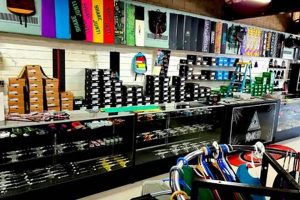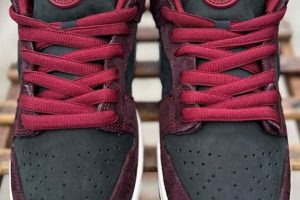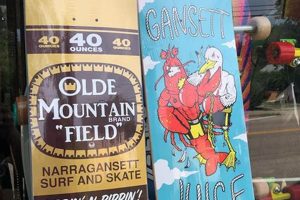Retail establishments located within shopping malls that specialize in skateboarding equipment, apparel, and accessories provide a convenient and accessible resource for both novice and experienced skateboarders. These locations typically offer a range of products, including skateboards, wheels, trucks, bearings, shoes, clothing, and protective gear, catering to a diverse customer base seeking skateboarding-related goods within a contained shopping environment. They distinguish themselves by existing within a larger retail ecosystem.
These establishments play a role in promoting skateboarding culture and accessibility. Their presence within malls offers increased visibility and foot traffic, potentially attracting new participants to the sport. The benefits extend to providing a localized point of purchase for essential skateboarding equipment, reducing the need for extensive travel to specialty stores. Historically, they emerged as skateboarding gained mainstream popularity, offering a more accessible alternative to independently owned skate shops.
The following sections will delve into the specific product offerings found within these retail spaces, the customer experience they cultivate, and the challenges and opportunities they face in a dynamic retail landscape. Examination of inventory management, sales strategies, and community engagement efforts will also be presented.
Essential Guidance from Mall Skate Shops
The following recommendations, derived from the operational experience of establishments specializing in skateboarding equipment within shopping malls, are intended to inform purchasing decisions and enhance the skateboarding experience.
Tip 1: Equipment Assessment. Prior to purchasing a complete skateboard, evaluate intended usage. Street skating requires durable decks and responsive trucks, while park skating benefits from lighter setups with increased maneuverability. Consultation with shop personnel is advised.
Tip 2: Footwear Considerations. Select skate shoes with reinforced construction and durable outsoles. Suede or canvas uppers provide abrasion resistance. Look for features like ollie patches and cushioned insoles to enhance performance and comfort.
Tip 3: Protective Gear. Prioritize safety by investing in certified helmets, knee pads, elbow pads, and wrist guards. Ensure proper fit and secure fastening. Consistent use of protective gear minimizes the risk of injury.
Tip 4: Bearing Maintenance. Regular cleaning and lubrication of skateboard bearings extend their lifespan and maintain optimal performance. Remove bearings periodically, clean with solvent, and re-lubricate with appropriate skate bearing lubricant.
Tip 5: Wheel Selection. Wheel durometer (hardness) affects grip and speed. Softer wheels (78a-85a) provide better grip on rough surfaces, while harder wheels (99a-101a) offer increased speed and slide capability on smooth surfaces. Select wheels appropriate for the intended terrain.
Tip 6: Deck Preservation. Store skateboards in dry environments to prevent warping and delamination. Avoid prolonged exposure to direct sunlight and extreme temperatures. Consider applying a thin layer of sealant to the deck edges to minimize water damage.
The consistent application of these practices will contribute to enhanced safety, performance, and equipment longevity, ultimately maximizing the enjoyment derived from skateboarding.
The subsequent section will address common challenges encountered by these specialized retailers and strategies for navigating the evolving retail sector.
1. Accessibility
The presence of skate shops within shopping malls inherently provides a high degree of accessibility, serving as a primary factor in their operational model. This accessibility stems from several key elements: centralized location, extended operating hours, and ease of navigation within the mall environment. Malls, designed to attract a broad consumer base, inherently generate foot traffic that directly benefits skate shops, exposing the sport and its associated culture to individuals who might not otherwise seek out specialized retailers. The extended hours, often mirroring those of the mall itself, offer a broader window for purchases and inquiries, catering to diverse schedules. The internal mall layout further contributes, streamlining the customer experience and reducing the perceived barrier to entry associated with locating independent skate shops, often situated in less trafficked or specialized areas. This ease of access directly correlates with increased sales volume and brand visibility, particularly among novice skateboarders and casual consumers.
The importance of accessibility can be illustrated through examining sales data. Mall-based skate shops often report higher sales of beginner boards and protective gear compared to their independent counterparts. This suggests that the convenience and approachability of the mall setting encourage initial experimentation with skateboarding. Furthermore, accessibility impacts the formation of local skateboarding communities. Mall skate shops frequently become meeting points for young skaters, providing a safe and easily accessible space for interaction and knowledge sharing. For example, a skate shop located near a mall’s food court or entertainment area naturally benefits from pre-existing social gatherings, allowing it to integrate into the community fabric more seamlessly.
In conclusion, accessibility represents a cornerstone of the mall skate shop model. Its influence extends from increased sales and brand awareness to the fostering of skateboarding communities. While challenges such as higher rent and mall regulations exist, the inherent advantage of accessibility remains a significant asset, shaping the customer base and overall viability of these specialized retailers. The understanding of this dynamic is essential for both skate shop operators and mall management seeking to optimize the integration of skateboarding culture within the broader retail landscape.
2. Product Variety
The breadth of product offerings within a mall skate shop directly influences its customer appeal and market position. A diverse inventory caters to a wider spectrum of skateboarding skill levels and preferences, ranging from complete beginner setups to specialized components for experienced riders. This variety, encompassing skateboards, trucks, wheels, bearings, apparel, protective gear, and related accessories, functions as a key driver of customer traffic and sales conversion. Shops offering limited selection risk alienating segments of the skateboarding community, while those with expansive inventories can attract a more diverse clientele. The availability of different brands, price points, and styles contributes to a competitive advantage within the mall environment, where consumers often have multiple retail options.
The importance of product variety extends beyond mere sales figures. It directly impacts the shop’s ability to foster a sense of community and expertise. A well-stocked shop can provide informed guidance to customers seeking specific gear for their individual needs and riding styles. For example, a shop that carries a wide range of wheel durometers can educate customers on the benefits of softer wheels for street skating versus harder wheels for park riding. Similarly, offering various truck sizes and brands allows customers to fine-tune their board setup for optimal performance. Conversely, a limited selection can hinder the shop’s capacity to offer customized solutions and establish itself as a trusted source of skateboarding knowledge. Consider, for instance, a shop lacking a sufficient range of protective gear sizes; this deficiency not only limits sales but also potentially compromises customer safety and trust.
In conclusion, product variety stands as a critical component of the mall skate shop model, driving customer traffic, fostering community engagement, and enhancing the shop’s reputation as a reliable source of skateboarding expertise. Successfully managing inventory to balance demand with diverse customer needs presents an ongoing challenge, requiring careful analysis of sales trends, customer feedback, and industry developments. The strategic curation of product offerings directly contributes to the shop’s long-term sustainability and its role in promoting skateboarding culture within the mall environment and the broader community.
3. Community Hub
The function of retail locations specializing in skateboarding goods within shopping malls extends beyond mere commercial transactions. Such establishments often serve as informal community hubs, fostering social interaction and knowledge exchange among skateboarders of varying skill levels. This role is particularly significant in suburban areas where alternative skateboarding spaces may be limited.
- Meeting Point and Gathering Space
Mall skate shops frequently act as designated or impromptu meeting locations for skateboarders. The accessibility of the mall environment, coupled with the shared interest in skateboarding, encourages individuals to congregate before or after skating sessions. This provides a platform for social interaction, facilitating the formation of friendships and peer networks centered around the sport. The presence of the shop itself serves as a visible signal to other skateboarders within the mall, further solidifying its role as a gathering point.
- Information Exchange and Skill Development
These shops provide an environment where experienced skateboarders can share their knowledge and skills with less experienced individuals. Informal tutorials and demonstrations may occur spontaneously, while shop staff often offer advice on equipment selection and technique. This peer-to-peer learning is a valuable resource for beginners, accelerating their skill development and fostering a sense of belonging within the skateboarding community. The shop’s physical space enables this exchange, providing a readily accessible venue for learning and mentorship.
- Event Sponsorship and Promotion
Many mall skate shops actively participate in the local skateboarding community by sponsoring events and promoting skateboarding culture. This may include organizing skateboarding competitions, supporting local skateboarding teams, or hosting film screenings and art exhibitions related to skateboarding. By engaging in these activities, the shop reinforces its commitment to the community and enhances its visibility among skateboarders. The shop’s role as a sponsor can also provide opportunities for emerging skateboarders to gain recognition and exposure.
- Safe Haven and Supportive Environment
Mall skate shops can offer a sense of safety and support for skateboarders, particularly younger individuals. The controlled environment of the mall, combined with the presence of responsible shop staff, can provide a secure space for skateboarders to gather and express themselves. The shop can also serve as a resource for information and support on issues related to skateboarding, such as injury prevention and responsible skateboarding practices. This supportive environment contributes to the overall well-being of the skateboarding community and promotes a positive image of the sport.
The function as a community hub contributes to the sustainability of mall skate shops by fostering customer loyalty and generating positive word-of-mouth referrals. It also enhances the overall cultural value of the shop, transforming it from a mere retail outlet into a vital component of the local skateboarding landscape. Understanding and nurturing this community aspect is essential for the long-term success of mall skate shops.
4. Retail Environment
The retail environment, encompassing physical space, ambient conditions, and the overall shopping experience, exerts a significant influence on the performance and perception of businesses operating within it. For establishments specializing in skateboarding goods located within shopping malls, the specifics of this environment create both opportunities and challenges that necessitate careful consideration.
- Foot Traffic and Visibility
Mall environments inherently provide high foot traffic, exposing skate shops to a broad range of potential customers, including those not actively seeking skateboarding products. This increased visibility can translate to higher sales volume, particularly for impulse purchases and introductory skateboarding equipment. However, this benefit is contingent upon strategic placement within the mall to maximize exposure to relevant demographics and minimize competition from adjacent retailers.
- Mall Demographics and Target Audience
The demographic profile of a shopping mall significantly impacts the potential customer base for skate shops. Malls catering to younger demographics or families often provide a more receptive market for skateboarding products. Conversely, malls targeting older or more affluent demographics may require tailored marketing strategies to attract interest. Understanding the mall’s overall customer base is essential for aligning product offerings and promotional efforts with the needs and preferences of potential buyers.
- Competition and Co-Tenancy
The presence of competing retailers within the mall environment can influence the performance of skate shops. Direct competitors selling similar skateboarding products can dilute market share, necessitating differentiated product offerings and competitive pricing strategies. Conversely, complementary retailers, such as athletic shoe stores or apparel shops, can indirectly benefit skate shops by attracting customers interested in related products. Strategic co-tenancy, where skate shops are located near complementary businesses, can enhance overall customer traffic and sales.
- Mall Management and Regulations
Mall management policies and regulations can significantly impact the operation of skate shops. Restrictions on skateboarding within the mall premises, limitations on exterior signage, and requirements for specific store layouts can all influence the shop’s ability to attract customers and promote its products. Furthermore, mall management often dictates operating hours, lease terms, and common area maintenance fees, which can impact the shop’s profitability. Establishing a positive relationship with mall management and understanding its regulations is crucial for ensuring smooth operations and long-term success.
The interplay between these facets of the retail environment ultimately shapes the operational landscape for mall skate shops. Successfully navigating these influences requires careful analysis of mall demographics, strategic placement within the mall, effective marketing strategies, and proactive communication with mall management. The ability to adapt to the unique characteristics of the retail environment is paramount for maximizing sales, fostering community engagement, and ensuring the long-term viability of these specialized retailers.
5. Expert Guidance
Expert guidance, within the context of establishments specializing in skateboarding goods and located within shopping malls, represents a critical value proposition. It significantly impacts customer experience, product selection, and the overall perception of the shop within the skateboarding community and the broader consumer market.
- Product Knowledge and Matching
Mall skate shops often cater to a diverse clientele, including novice skateboarders and seasoned enthusiasts. Staff expertise in assessing customer needs and recommending appropriate equipment is paramount. This includes understanding the nuances of different board types, truck sizes, wheel durometers, and protective gear. Expert guidance ensures customers purchase equipment suited to their skill level, riding style, and intended use, enhancing safety and performance.
- Technical Support and Maintenance Advice
Providing technical support and maintenance advice distinguishes reputable skate shops from purely transactional retailers. Staff expertise should encompass skateboard assembly, bearing maintenance, truck adjustments, and deck care. Offering guidance on these aspects extends the lifespan of skateboarding equipment and fosters customer loyalty. Knowledgeable staff can diagnose problems, offer solutions, and educate customers on preventative maintenance practices.
- Safety Instruction and Risk Mitigation
Skateboarding inherently involves risks of injury. Expert guidance includes providing safety instruction and promoting the use of protective gear. Staff should be knowledgeable about common skateboarding injuries and preventative measures. Encouraging the use of helmets, knee pads, elbow pads, and wrist guards is essential. Expert guidance contributes to a safer skateboarding environment and reduces the likelihood of injury-related incidents.
- Community Building and Cultural Transmission
Expert guidance extends beyond technical knowledge to encompass the cultural aspects of skateboarding. Staff often serve as ambassadors of skateboarding culture, sharing information about skateboarding history, trends, and local skateboarding communities. They can connect customers with local skate parks, events, and other resources. This contributes to building a sense of community and fostering a positive image of skateboarding.
The provision of expert guidance elevates mall skate shops beyond mere retail outlets. It transforms them into valuable resources for skateboarders of all levels. Shops that prioritize staff training and knowledge acquisition gain a competitive advantage and enhance their reputation within the skateboarding community. The integration of expert guidance into the retail experience fosters customer loyalty, promotes safety, and strengthens the cultural fabric of skateboarding.
Frequently Asked Questions
The following questions address common inquiries and concerns related to retail establishments specializing in skateboarding equipment within shopping malls. The information provided aims to clarify operational aspects and customer expectations.
Question 1: Are the products sold in mall skate shops comparable in quality to those found in independent skate shops?
The quality of products varies. Reputable mall skate shops typically stock established brands, ensuring a reasonable level of quality. However, it is advisable to examine materials, construction, and certifications prior to purchase. Independent shops may offer specialized or higher-end products.
Question 2: What are the typical price ranges for skateboards and accessories in mall skate shops?
Price ranges vary depending on brand, materials, and features. Complete beginner skateboards may be found for under $100, while higher-end setups can exceed $200. Accessories such as wheels, trucks, and bearings have varied price points according to material and brand.
Question 3: Do mall skate shops offer repair services or technical assistance?
Service offerings vary. Some mall skate shops provide basic repair services, such as bearing replacement or truck adjustments. However, extensive repairs or custom modifications may require specialized service from independent shops.
Question 4: What is the return policy for items purchased at mall skate shops?
Return policies are determined by individual store policies. Customers should review the store’s return policy prior to purchase. Common restrictions may include time limits, requirements for original packaging, and exclusions for used or damaged items.
Question 5: Do mall skate shops offer warranties on their products?
Warranty coverage is determined by the manufacturer. Reputable brands typically offer limited warranties against manufacturing defects. However, warranties do not cover damage resulting from misuse, wear and tear, or accidental damage.
Question 6: Are mall skate shops knowledgeable about skateboarding and able to provide advice to beginners?
Staff expertise varies. Some mall skate shops employ knowledgeable staff who can provide guidance to beginners on equipment selection and basic techniques. However, customers seeking advanced instruction may benefit from seeking advice from experienced skateboarders or qualified instructors.
This FAQ provides a general overview of common inquiries regarding mall skate shops. Customers are encouraged to contact individual stores for specific details regarding their products, services, and policies.
The subsequent section will address the future outlook and trends affecting the mall skate shop industry.
Conclusion
This exploration has illuminated the multifaceted role of retail establishments specializing in skateboarding equipment within shopping malls. These locations serve as accessible points of entry for the sport, offering product variety and, in some cases, fostering nascent skateboarding communities. The retail environment, defined by mall demographics and management regulations, directly influences their operational viability. The provision of expert guidance further differentiates these shops, impacting customer satisfaction and brand perception.
The future trajectory of mall skate shops hinges on their ability to adapt to evolving consumer preferences, online competition, and the changing landscape of the retail sector. Sustained success requires a commitment to product quality, customer service, and a genuine engagement with the skateboarding community. Understanding these dynamics remains crucial for stakeholders seeking to navigate this specific segment of the skateboarding industry.







